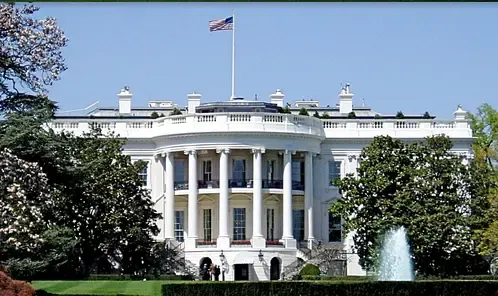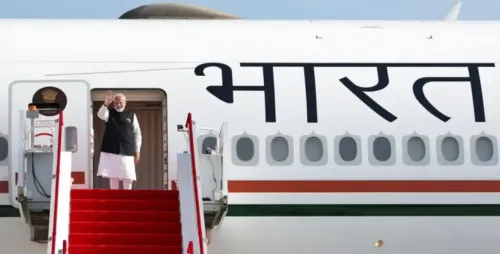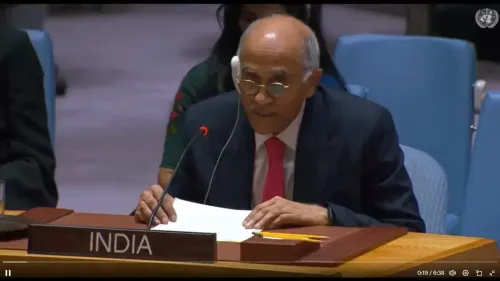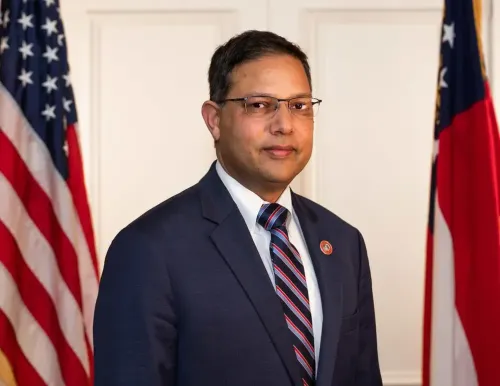Can Pakistan Balance Its Economy with US Relations While Facing Taliban Threat?

Synopsis
Key Takeaways
- Pakistan is under pressure from the US to address security concerns in Balochistan.
- The Taliban poses a significant threat to Pakistan's stability.
- Negotiating with the Taliban is complicated due to mutual accusations.
- China's economic interests add layers of complexity to Pakistan's situation.
- Pakistan's government faces a critical decision regarding US relations.
New Delhi, Sep 24 (NationPress) Pakistan finds itself in a precarious situation as Prime Minister Shehbaz Sharif and Field Marshal Asim Munir are preparing for a crucial meeting with US President Donald Trump this Thursday.
The discussion will center around a significant minerals deal, with the US expressing serious concerns regarding the ongoing situation in Balochistan.
President Trump is expected to address security challenges with Pakistan, particularly inquiring about strategies to combat terrorist organizations in the region.
The Balochistan National Army (BLA) and Tehreek-e-Taliban Pakistan (TTP) represent substantial threats to the Pakistani military, and the US will seek assurances on security before proceeding with any agreements.
Amid an already unstable regional environment and pressure from China regarding the China Economic Corridor Project (CEPC), Islamabad faces yet another dilemma.
The Afghan Taliban is gearing up for potential conflict should the US attempt to reclaim the Bagram airbase in Afghanistan.
During a high-level session, the Taliban leadership indicated they would confront Pakistan if US pressure over the airbase continues.
While the Taliban did not openly discuss a conflict with the United States, they were clear in their stance against Pakistan, which they believe is supporting US interests.
Trump's keen interest in the airbase is likely to be a focal point during the Thursday discussions, as he may demand cooperation from Pakistan regarding this matter.
Trump's foreign policy often comes with significant implications, and if he seeks a minerals deal, he may also expect assistance in retaking the airbase.
This presents a catch-22 for Pakistan, as the minerals deal is vital for reviving its long-struggling economy.
Not only does it hinge on the US agreement, but it also faces competition from the CPEC 2.0 initiative that China has urged Pakistan to fund.
Recently, Trump has reiterated threats regarding the potential for US forces to reclaim the strategic Bagram Air Base, warning that dire consequences would follow if the Taliban does not comply.
However, officials suggest that Trump prefers to avoid initiating wars. If he were to engage in conflict in Afghanistan, it could alienate his supporters who oppose funding wars.
In this context, Trump may insist on Pakistan assisting the US in re-establishing control over the airbase, increasing the pressure on Pakistan's leadership, which is already grappling with threats from the BLA and TTP.
Engaging in a conflict with the Taliban would lead to further escalation, and experts argue that Pakistan lacks the capacity for such a confrontation.
Moreover, Pakistan is not positioned to negotiate with the Taliban, which has been accused of supporting the TTP—a claim the Taliban denies.
With Pakistan-Afghanistan relations at a significant low, confrontation with the Taliban is the last scenario Islamabad desires.
Refusing Trump's demands may also not be a viable option for Pakistan.
The Taliban, led by Hibatullah Akhundzada, has firmly stated that the airbase will not be surrendered.
During a meeting with senior officials, the decision to transfer Bagram was decisively rejected, accompanied by a warning to Pakistan that any support for such a move would label it an enemy state.
The Taliban is also reaching out to major global and regional powers, including India, China, Russia, Iran, the UAE, and Saudi Arabia, to advocate their position.
"In alignment with Islamic principles and a balanced, economy-focused foreign policy, the Islamic Emirate of Afghanistan seeks positive relations with all nations rooted in mutual interests," the Taliban stated.
"It should be noted that under the Doha Agreement, the US committed to not utilizing or threatening force against Afghanistan's territorial integrity or political sovereignty, nor to meddle in its domestic affairs. Therefore, adherence to these commitments is essential," the statement concluded.









